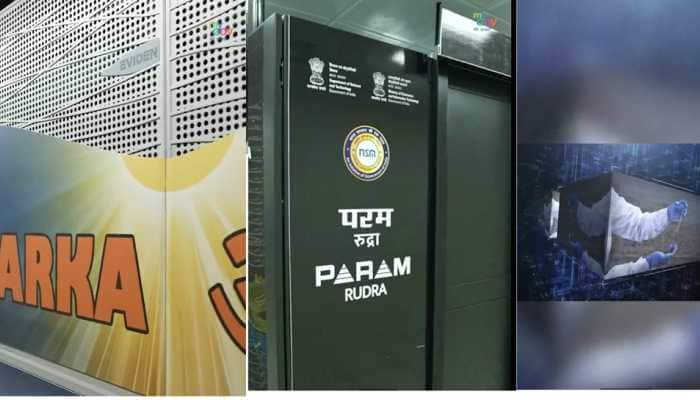World Thyroid Day 2024: Busting 5 Common Myths About Diet In Hypothyroidism - Expert Speaks
A balanced diet can help manage symptoms, prevent complications, and enhance the effectiveness of prescribed treatments for hypothyroidism patients. However, several myths prevail about what people with hypothyroidism can and can't eat - a doctor busts common misconceptions.
- World Thyroid Day is observed on May 25 every year
- Hypothyroidism, a condition where the thyroid gland is underactive, often leads to a plethora of dietary advice and misconceptions
- By adhering to dietary recommendations, patients can improve their quality of life but there are certain myths regarding the diet that need to be busted
Trending Photos
) An underactive thyroid gland leads to hypothyroidism (Image by Freepik)
An underactive thyroid gland leads to hypothyroidism (Image by Freepik) World Thyroid Day: A global healthcare event celebrated on May 25, World Thyroid Day aims to create awareness about the significance of the thyroid gland and urge people to educate themselves about the conditions that can affect it. Thyroid disease is the generic term for medical conditions that do not allow the thyroid gland - a crucial gland in the body - to produce a sufficient amount of hormones. When the thyroid gland starts secreting either more or lesser hormones than required, then it may have a negative impact on the human body. The condition when the thyroid gland produces too much hormones is called hyperthyroidism; and when it produces less than required hormones, it is called hypothyroidism.
Dietary Myths About Hypothyroidism
Hypothyroidism, a condition where the thyroid gland is underactive, often leads to a plethora of dietary advice and misconceptions. Some of the common myths are about the consumption of cruciferous vegetables, Brazilian nuts, gluten, and iodine-rich foods. "A balanced diet can help manage symptoms, prevent complications, and enhance the effectiveness of prescribed treatments of hypothyroidism patients. Proper nutrition aids in regulating metabolism, boosting energy levels and supporting immune function, all of which are vital for individuals with thyroid disorders. By adhering to dietary recommendations, patients can improve their quality of life and achieve better health outcomes but there are certain myths regarding the diet that need to be busted," says Dr Shyam Sundar CM, Consultant Endocrinology and Diabetology, SPARSH Hospital, Bangalore.
World Thyroid Day: Busting Common Myths About Hypothyroidism Diet
Dr Shyam Sundar CM addresses the popular misconception about diet and hypothyroidism:
1. Myth: Avoid Cruciferous Vegetables
A common myth is that individuals with hypothyroidism should avoid cruciferous vegetables such as cabbage, cauliflower, and broccoli. These vegetables contain thiocyanates, compounds that, in excessive amounts, can inhibit thyroid hormone synthesis. However, the key is moderation. In certain populations that consume large quantities of these vegetables daily, thiocyanate levels may indeed interfere with thyroid function. However, in a typical Indian diet, where cruciferous vegetables are consumed only a few times a week, their impact is negligible. Therefore, it's a myth that people with hypothyroidism need to completely avoid these vegetables. They can be part of a balanced diet without affecting thyroid hormone synthesis.
For individuals on thyroid hormone replacement therapy, like levothyroxine, the concern is even less significant. These individuals are already supplementing their hormone levels, so occasional consumption of cruciferous vegetables will not interfere with their treatment.
2. Myth: Brazilian Nuts Cure Hypothyroidism
Another widespread myth is that Brazilian nuts can cure hypothyroidism. This belief stems from the fact that Brazilian nuts are rich in selenium, a trace element essential for thyroid function and immune health. Some social media influencers claim that consuming these nuts can eliminate the need for thyroid medication. While selenium deficiency is a concern in certain populations, particularly in parts of Europe, studies show that the Indian population generally has sufficient selenium levels. For individuals with adequate selenium intake, additional supplementation does not cure subclinical hypothyroidism. Subclinical hypothyroidism often resolves on its own, especially if triggered by temporary factors such as viral infections or stress. Only a small percentage of cases progress to overt hypothyroidism. Replacing prescribed thyroid medication with Brazilian nuts based on unverified claims can lead to elevated thyroid levels and worsening symptoms.
3. A Gluten-Free Diet Is A Must For Those With Hypothyroidism
A common misconception is that individuals with hypothyroidism should follow a gluten-free diet. While it is true that there is a higher prevalence of gluten sensitivity among those with autoimmune thyroid disorders, it does not mean that everyone with hypothyroidism needs to avoid gluten. Only those who have symptoms of gluten sensitivity should consult their doctor and consider dietary changes. A gluten-free diet is not necessary for all individuals with hypothyroidism.
Also Read: Hypothyroidism Management With Right Diet And Yoga Asanas - Check Expert's Advice
4. Say No To Ragi If You Have Hypothyroidism
Some people believe that they should avoid consuming ragi (finger millet) if they have hypothyroidism. However, ragi can be consumed in moderation as part of a balanced diet. There is no need to eliminate it simply because of a hypothyroidism diagnosis.
5. Iodine-Rich Foods Help Overcome Hypothyroidism
Another myth is that consuming iodine-rich foods, such as seafood and seaweed can help overcome hypothyroidism. While iodine supplementation is crucial for people living in iodine-deficient areas, most individuals today, especially those using iodized salt, have adequate iodine levels. The most common cause of hypothyroidism now is autoimmune thyroid disorder, not iodine deficiency. Therefore, additional iodine from seaweed is unnecessary and will not cure hypothyroidism.
"Consulting a healthcare professional is crucial before altering diet or medication for hypothyroidism. Relying on evidence-based advice ensures balanced consumption of cruciferous vegetables, appropriate selenium intake, and the necessity of a gluten-free diet or iodine supplementation, preventing ineffective or harmful self-treatment practices," says Dr Shyam Sundar CM.
Stay informed on all the latest news, real-time breaking news updates, and follow all the important headlines in india news and world News on Zee News.
Live Tv







)
)
)
)
)
)
)
)
)
)
